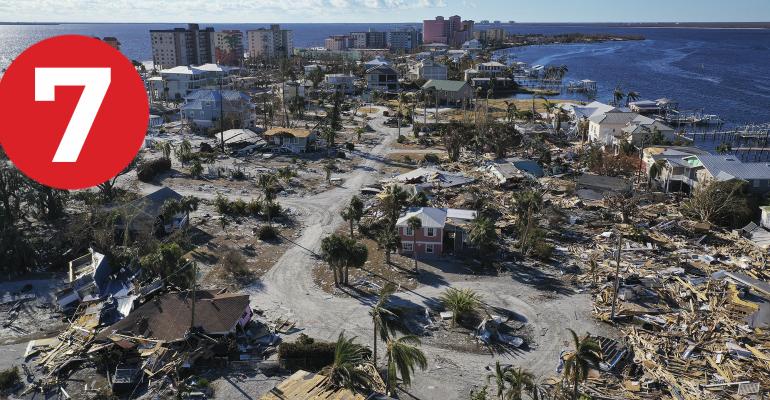- Florida Coastal Living Reshaped by Hurricane Housing Codes “Strong hurricanes and stricter building codes, arriving in succession, are changing the economic and demographic makeup of Florida’s coastal communities. Inexpensive cottages vulnerable to harsh weather are giving way to pricier homes that are more resilient—a transition that is fortifying the housing stock, but limiting who can afford to live on the coast. Adding to the costs are escalating premiums for homeowners and flood insurance.” (The Wall Street Journal)
- Mulling Office Amenities That Make Employees Want to Return “One of the commercial real estate maxims of the last year holds smart employers are now or soon will be trading in more office space for less but higher-quality office space. With some hybrid work likely to hang around permanently, employers will need less square footage than they did pre-pandemic. What will they do with the money saved? They’ll put it into Class A office space, the better to induce employees back, natch.” (Forbes)
- Manhattan Multifamily Sales Volume Continues to Increase as Possible Inflation Hedge “Sales of multifamily buildings in New York City might be reaching their vertical limit — if there is one — Commercial Observer has learned. The dollar volume of multifamily transactions was up 37 percent annually in the third quarter, according to investment sales firm Ariel Property Advisors. The average dollar volume was also 71 percent above the five-year quarterly average of $2.085 billion.” (Commercial Observer)
- Trump Hotels Charged Secret Service Exorbitant Rents, House Inquiry Finds “The Trump Organization charged the Secret Service up to $1,185 per night for hotel rooms used by agents protecting former President Donald J. Trump and his family, according to documents released on Monday by the House Oversight Committee, forcing a federal agency to pay well above government rates. The committee released Secret Service records showing more than $1.4 million in payments by the department to Trump properties since Mr. Trump took office in 2017.” (The New York Times)
- SPAC Sponsors Profited Even as Investors Lost “The implosion of the special-purpose acquisition company boom left mostly a string of losing investments in its wake, but it turns out there were a few winners. Those entities that collected healthy fees for overseeing the formation and execution of SPACs reaped the rewards of the trendy route to public listing.” (Bisnow)
- Newmark’s Knotel Turnaround Could Be Coming at the Best Possible Time “If there’s an effort afoot to rebrand and revive the coworking firm Knotel, it’s been hard to find. Last year, brokerage Newmark acquired the company after its bankruptcy and shook up Knotel’s executive ranks. Months on, some of its coworking competitors have said it appears the company has basically gone dark. But in recent months there have been small signals of a revival, or perhaps a second life, the culmination of the installation of a number of former WeWork execs, including Michael Gross, in top leadership positions last March.” (Commercial Observer)
- Why Spotify Decorated its New York City Office Building with Cat Statues “Companies in New York City's office corridors from Midtown to the Financial District have been getting creative to make their workplaces more attractive for employees returning to the workplace. Some have opened rooftop parks, others have adopted new hygiene protocols and, in the case of Condé Nast — which, like NYBJ’s parent company American City Business Journals, is owned by Advance Publications — offered free breakfast and lunch five days per week for nearly an entire year.” (New York Business Journal)
0 comments
Hide comments





